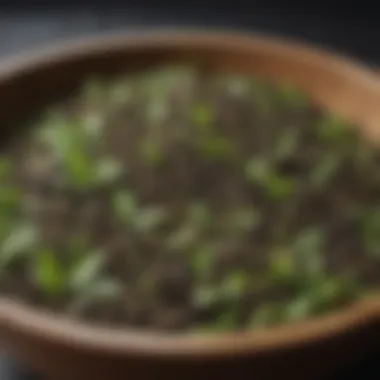Tea as a Natural Remedy for Stress Relief


Intro
In contemporary society, stress and mental health challenges have become increasingly prevalent. Individuals are often in search of effective methods for managing stress that do not rely solely on pharmaceutical solutions. Considering this need, this section will explore a natural approach—tea. Various types of tea contain compounds known for their calming effects. The preparation and consumption of tea encompass rituals that promote relaxation. By examining these elements, we will gain insight into how tea can contribute positively to mental well-being.
Understanding Mental Health and Well-being
What is Mental Health?
Mental health refers to cognitive, emotional, and social well-being. It affects how people think, feel, and act. Good mental health is essential for overall well-being, influencing how individuals handle stress, relate to others, and make choices.
The Importance of Prioritizing Mental Well-being
Prioritizing mental well-being is crucial in today’s fast-paced world. When mental health is maintained, individuals are often more resilient. They can face daily challenges with greater ease. Therefore, methods such as drinking tea, which may enhance mental health, deserve attention.
Common Mental Health Challenges and Disorders
Many people experience mental health challenges. Examples include anxiety disorders, depression, and stress-related issues. Addressing these conditions effectively can improve quality of life. A focus on lifestyle changes, including dietary choices and relaxation techniques, can contribute positively.
Strategies for Improving Mental Health
Self-care Techniques and Practices
Self-care is essential for maintaining mental health. Simple actions can lead to considerable improvements. Drinking tea can be a form of self-care. The act of setting aside time to prepare and enjoy tea encourages mindfulness and relaxation.
One can adopt various self-care practices, such as:
- Journaling: Writing down thoughts can clarify feelings.
- Physical activity: Exercise releases endorphins, supporting a positive mood.
- Meditation: Taking time to meditate enhances mental clarity and reduces anxiety.
Building Resilience and Stress Management
Building resilience involves developing coping strategies for stress. Techniques such as deep breathing and progressive muscle relaxation can help. Incorporating calming teas like chamomile or lavender may boost relaxation efforts, creating a conducive environment for resilience.
Seeking Professional Help: Therapy and Counseling
In more severe instances, professional help is crucial. Therapy and counseling can provide guidance and support. A psychologist may recommend complementary approaches alongside traditional therapy methods. The use of calming teas may be suggested to aid in relaxation during stressful periods.
Finding Balance in Life
Healthy Lifestyle Choices: Diet, Exercise, and Sleep
A balanced life requires attention to various lifestyle choices. Consuming a healthy diet influences mental health. Incorporating nutrient-rich foods and herbal teas can contribute positively. Also, regular physical activity is essential for mental and physical health. Proper sleep patterns are vital as well, as sleep deprivation can increase stress levels.
Mindfulness and Meditation Practices
Mindfulness is the practice of being present. Engaging in mindfulness activities or meditation can complement tea consumption. The aroma and warmth of tea can enhance the meditation experience, making it a beneficial pairing.
Setting Boundaries and Managing Time Effectively
Effective time management involves setting boundaries. Allocating time for personal interests, such as enjoying a cup of tea, supports mental health. These practices promote a sense of control and minimize feelings of being overwhelmed.
Enhancing Personal Development
Goal Setting and Productivity Tips
Setting achievable goals leads to a sense of purpose. Tea rituals can serve as a portion of this process. Taking breaks to enjoy tea while reflecting on goals may boost productivity.
Building Healthy Relationships and Social Connections
Social support networks play a role in maintaining mental health. Sharing a pot of tea with friends or family fosters connection. Open conversations, while enjoying tea, can strengthen bonds and alleviate stress.
Practicing Gratitude and Positivity
Cultivating gratitude can shift focus away from stressors. Taking a moment during tea time to reflect on positive aspects of life may foster a constructive mindset.
Tips for Maintaining Mental Well-being
Strategies for Preventing Burnout
Preventing burnout is crucial for maintaining mental health. Regularly engaging in activities that bring joy can reduce the risk. Drinking tea should be seen as a restorative practice rather than a mere consumption task.
Coping with Challenges and Setbacks


Life presents challenges that may induce stress. Utilizing tea as a coping mechanism can prove effective. Taking a moment for a cup of tea may provide the break needed to regain focus.
Creating a Supportive Environment
A supportive environment contributes to mental well-being. This can involve physical aspects, like a cozy space to enjoy tea. Emotional support from loved ones can further enhance this environment, promoting a sense of security.
Tea is more than just a beverage; it is a ritual that encourages a moment of peace and clarity in our busy lives.
In summary, tea can play a valuable role in managing stress and enhancing mental health. Understanding this connection offers individuals practical strategies for incorporating tea into their daily routines.
Understanding Stress
Understanding stress is vital as it sets the foundation for examining how tea may play a role in stress relief. Stress is a pervasive issue in modern society, affecting individuals across various demographics. Recognizing the triggers and effects of stress can lead to more effective management strategies. Understanding the nature of stress not only aids in identifying potential interventions but also helps to appreciate the significance of considering natural remedies like tea. By addressing stress comprehensively, we avoid oversimplification and embrace a nuanced view of mental health.
Definition and Types of Stress
Stress can generally be defined as a response of the body to a demand or challenge. This response can manifest in various forms. Acute stress refers to short-term stress that results from demands and pressures, often experienced in daily life situations. Chronic stress, on the other hand, persists for a prolonged period, often resulting from ongoing pressures like work or relationship problems. The distinction between these two types highlights why it is essential to measure and regulate stress effectively.
Different types of stress can affect individuals differently, influenced by personal resilience and coping mechanisms. Common types include:
- Environmental Stress: Arises from external conditions, such as pollution or noise.
- Physical Stress: Linked to bodily tension or injuries.
- Emotional Stress: Results from emotional conflicts or psychological issues.
- Social Stress: Comes from interpersonal relationships and societal pressures.
Understanding these types assists in tailoring stress management strategies to individual needs.
Physiological Effects of Stress
The physiological effects of stress are profound. When faced with stress, the body often activates the "fight or flight" response. This biological reaction leads to increased heart rate, elevated blood pressure, and heightened adrenaline levels. Such physiological changes prepare the body to confront threats, but when stress becomes chronic, these effects can be damaging.
Common physiological side effects can include:
- Weakened immune system
- Increased risk of cardiovascular diseases
- Gastrointestinal issues
- Muscle tension
Over time, these effects can compromise overall health. Recognizing these physiological impacts underscores the importance of managing stress through various means, including lifestyle choices and dietary interventions, such as tea consumption.
Psychological Implications of Stress
Psychologically, stress can create a cycle of negative thought patterns and emotional distress. Individuals experiencing high levels of stress may develop anxiety, depression, and diminished happiness. Cognitive functions can also suffer; focusing becomes challenging, and decision-making abilities may decline.
Stress can alter one’s self-perception and influence interactions with others. Social withdrawal and irritability are common reactions, leading to strained relationships. It is essential to recognize these psychological ramifications to advocate for effective interventions that can mitigate stress. The potential of tea as a calming agent may play a significant role here, offering a pathway towards improving mental wellbeing.
"Stress not only impacts the body but also distorts our emotions and cognitive processes, making it imperative to address through effective means."
In summary, understanding stress involves dissecting its definitions, types, and impacts. This knowledge serves as a critical component in exploring how tea can contribute as a remedy.
Tea: An Overview
The exploration of tea serves as an essential part of understanding its potential effects on stress relief. Within this framework, tea is not merely a beverage; it embodies a cultural practice that aligns with relaxation and mindfulness. The significance of tea arises from its longstanding history and various types, each with unique properties affecting mental states. Engaging with tea can contribute to a soothing routine, making it a valuable ally in managing stress.
History of Tea Consumption
Tea has a rich history dating back thousands of years. Originating in China, it has evolved into a global phenomenon. Initially, tea was consumed for its medicinal properties before it became a favored daily ritual. Various cultures adapted the practice, introducing diverse preparation methods and ceremonies.
The Japanese tea ceremony, for example, emphasizes harmony and tranquility, highlighting how tea drinking can be much more than just a casual sip. This ritualistic approach to tea sets a foundation for its stress-relieving qualities, as it encourages mindfulness and a pause in daily chaos.
Types of Tea
The world of tea is broad, encompassing a variety of types, each possessing distinct characteristics and health benefits.
Black Tea
Black tea is one of the most consumed teas globally, recognized for its robust flavor and high caffeine content. This characteristic allows it to provide a stimulating effect, enhancing alertness. However, excessive caffeine can lead to heightened anxiety in some individuals. Thus, moderation is key when considering black tea for stress relief. Its rich antioxidant properties also play a part in promoting overall wellness, making it a popular choice among tea enthusiasts.
Green Tea
Green tea is often lauded for its calming effects, attributed to a unique combination of caffeine and L-theanine. This balance allows for mental clarity without the jitteriness associated with strong caffeine sources. Furthermore, green tea contains catechins, which may benefit mental health by reducing stress and anxiety levels. Its gentle profile makes green tea an ideal option for those seeking relaxation while boosting their energy levels.
Herbal Tea
Herbal tea encompasses a wide variety of infusions that are caffeine-free. Ingredients such as chamomile, lavender, and peppermint are commonly used for their calming properties. Each herb carries its unique benefits; for example, chamomile is renowned for its sleep-inducing properties, while peppermint may provide a refreshing effect. Herbal teas are versatile and are particularly effective for those who may be sensitive to caffeine.
Oolong Tea
Oolong tea presents a mid-range option between black and green teas in terms of oxidation and flavor. This variety is known for its ability to improve mental focus and calm the mind. It possesses a moderate caffeine level, providing a lift without overwhelming the nervous system. The unique flavor profiles of oolong tea can enhance the overall drinking experience, making it a delightful addition to a stress-relieving routine.


White Tea
White tea is the least processed among all tea types, resulting in a delicately mild flavor. It has a low caffeine content, making it a suitable choice for relaxation. White tea is rich in antioxidants, contributing positively to overall health. Its subtlety is appealing to those seeking a gentle approach to stress management. Additionally, it can serve as a refreshing alternative in warmer climates, promoting a soothing ritual.
"The type of tea you choose can significantly influence your mental health and relaxation journey."
In Summary, understanding the history and types of tea creates a foundation for exploring their efficacy as stress relief tools. Each type of tea brings something unique to the table, allowing individuals to find the right fit for their preferences and lifestyle. The next sections will delve deeper into the complex compounds within tea and how they contribute to mental wellness.
Active Compounds in Tea
The exploration of active compounds in tea is essential in understanding its potential role in stress relief. These compounds can exert various effects on the body and mind, which may promote relaxation and reduce anxiety. Caffeine, L-theanine, and antioxidants found in tea are pivotal in this context. Each element interacts with our biological systems in unique ways, either individually or synergistically, contributing to the overall calming impacts of tea consumption. This section will delve into each of these components to unravel their specific contributions to stress relief.
Caffeine and Its Effects
Caffeine is arguably the most recognized compound present in tea. It acts primarily as a stimulant. Many people consume it for an energy boost. However, its effects on stress relief are more nuanced. While excessive caffeine intake might lead to increased anxiety in some individuals, moderate consumption can enhance focus and alertness. This sharpens the mind. Moreover, research suggests that caffeine at low doses may help improve mood and cognitive performance. For individuals who are sensitive to caffeine, it is important to monitor its effects. Balancing caffeine intake while enjoying tea can be critical for maximizing its stress-relieving benefits.
L-theanine: A Relaxing Component
L-theanine is an amino acid found predominantly in green tea. Its relaxing properties are well-documented. It is known to promote relaxation without sedation. This aspect differentiates L-theanine from caffeine. It can counteract the jittery effects of caffeine, often leading to a balanced state of calm alertness. Studies have shown that L-theanine increases the production of alpha waves in the brain. This state is associated with relaxation but also improved creativity and focus. Integrating teas rich in L-theanine, such as green tea, into one’s diet may enhance the experience of calmness, proving beneficial during stressful periods.
Antioxidants and Stress Relief
Tea is rich in antioxidants, particularly catechins and flavonoids. These compounds are not only good for physical health but also play a role in managing stress. Antioxidants help combat oxidative stress, which can have detrimental effects on mental health. By neutralizing free radicals, they may reduce inflammation and health issues linked to chronic stress. Moreover, some studies indicate that these antioxidants may help improve mood and emotional well-being. Drinking tea regularly could contribute to a protective effect against stress, reinforcing the importance of antioxidants in a stress-relief strategy.
Overall, understanding these active compounds enhances our appreciation of tea's role in stress relief. Careful selection and consumption of tea can significantly influence mental health and well-being.
Scientific Studies on Tea and Stress
Understanding the scientific studies surrounding tea and its effects on stress is pivotal in establishing its role as a reliable stress relief tool. Research in this area provides substantive evidence that supports claims of tea’s calming properties. Various studies contribute to our understanding by isolating compounds in tea and assessing their impact on stress-related symptoms. This helps in identifying both the efficacy and potential limitations of tea consumption for stress relief.
Research on Herbal Teas
Herbal teas are often recommended for their soothing effects, but specific scientific research highlights the role they can play in stress reduction. For instance, chamomile and lavender teas have been subjects of several studies. A systematic review indicated that chamomile may have mild sedative effects and can help alleviate anxiety. Lavender tea also showed promise in managing stress and anxiety levels. In a controlled study, participants who consumed chamomile exhibited reduced levels of the stress hormone cortisol. This suggests that herbal tea can indeed be a beneficial component in managing stress.
Effects of Green Tea on Anxiety
Green tea has gained attention in research as a beverage that may provide psychological benefits. It contains L-theanine, which is known to induce relaxation without causing drowsiness. In various trials, participants who consumed green tea showed signs of reduced anxiety. A significant study demonstrated that individuals consuming green tea extract reported lower stress levels compared to those who did not partake in green tea consumption. The presence of antioxidants further contributes to overall mental wellness, suggesting a dual action of both calming and health-promoting effects.
Comparative Studies: Tea vs. Other Beverages
Comparing tea with other beverages reveals distinct advantages in stress relief. Studies have indicated that participants consuming tea reported lower stress levels than those consuming alternative caffeinated beverages like coffee or energy drinks. For instance, one research study focused on tea and soft drinks and found that participants consuming tea experienced fewer symptoms of tension and stress. This points to tea’s unique composition, particularly its blend of caffeine and L-theanine, which may create a more balanced stimulant effect. Such findings underline the importance of not only what one drinks but also how different beverages can influence mental health and stress levels.
"Scientific evidence increasingly supports tea as a valuable ally in stress management strategies, illustrating its efficacy alongside lifestyle practices."
Integrating knowledge from these studies can empower individuals to make informed decisions about their beverage choices. As we explore the interplay between stress and beverage consumption, these insights offer practical ways to incorporate tea into daily routines for improved mental health.
The Ritual of Tea Drinking
The act of tea drinking extends beyond simply consuming a beverage; it transforms into a ritual that can cultivate tranquility and enhance mental well-being. Engaging in this ritual can create a moment of pause in our hectic lives. This section explores various elements that contribute to the effectiveness of tea as a stress-relief tool through the lens of preparation, environment, and social interaction.
Mindfulness and Tea Preparation
Mindfulness involves being fully present in the moment and aware of one's surroundings. The preparation of tea is an ideal opportunity to practice mindfulness. From selecting tea leaves to boiling water, each step requires attention and care. This intentionality can turn a mundane task into a meditative experience.
The very act of making tea can be therapeutic. For example, the aroma of loose leaf tea can awaken the senses and ground individuals, promoting a state of calm. When one focuses on the temperature of water or the steeping time, it reduces mental clutter. This simplicity allows the mind to rest, which can help lower stress levels.
In addition, taking time for tea preparation can encourage a break from screens and the fast-paced nature of daily life. By carving out this small period for oneself, individuals can reinforce habits that prioritize mental health.
Creating a Calm Environment
The ambient setting in which one drinks tea also plays a significant role in promoting relaxation. To foster a calm environment, consider lighting, seating, and surrounding decor. Soft lighting and comfortable seating can help induce a relaxed state. Aromatic candles or calming music may further enhance this atmosphere.
Nature can serve as a powerful backdrop. Enjoying tea outdoors or near a window with views of greenery can add an extra layer of peace. The connection between nature and mental well-being has been supported by various studies, suggesting that such settings may reduce stress levels.
Creating a dedicated space for tea drinking can also signal a retreat from busyness. This space can be adorned with personal items that evoke positive feelings or memories, making the ritual more meaningful.
Social Aspects of Tea Drinking
Sharing tea with others brings social interaction into the mix, which can be beneficial for stress relief. Human connection is essential for emotional health. Engaging with friends or family over a cup of tea encourages conversation and the sharing of experiences, fostering a sense of community.
This communal aspect of tea drinking can promote feelings of belonging and support. A group tea session may include discussions about daily challenges or lighthearted exchanges, both of which can uplift mood and alleviate stress. The informal nature of such gatherings allows for open dialogue and emotional connection.


Moreover, cultural traditions around tea can also deepen connections. For instance, the Japanese tea ceremony emphasizes harmony and respect, enriching the act of tea drinking with a sense of purpose and appreciation.
In summary, the ritual of tea drinking incorporates mindfulness, environmental awareness, and social bonds. Together, these elements work to create a relaxing experience, making tea not just a beverage but a powerful ally in stress management.
Incorporating Tea into Daily Life
Incorporating tea into daily life can significantly enhance one's ability to manage stress. The process of brewing and enjoying a cup of tea goes beyond mere consumption; it encapsulates rituals and moments of calm. These elements are crucial for mental health amid busy schedules and demanding lifestyles. Regular tea drinking facilitates relaxation, allowing individuals to carve out time in their day solely for self-care. Integrating tea routines can foster a sense of mindfulness, enabling better emotional regulation and reducing anxiety.
Identifying Ideal Tea Types for Stress Relief
Choosing the right type of tea is essential for optimizing its stress-relieving benefits. Here are some tea varieties known for their calming effects:
- Chamomile: Widely recognized for its soothing properties, chamomile tea may help improve sleep quality and reduce anxiety levels.
- Lavender: This aromatic tea can induce relaxation and is often used for its calming effects on the mind and body.
- Green Tea: Rich in the amino acid L-theanine, green tea is shown to promote relaxation without the sedation that can come from other beverages.
- Peppermint: Known for its refreshing flavor, peppermint tea can aid digestion and promote a sense of relaxation, especially after meals.
Selecting a variety of these teas and tailoring them to one’s specific stress triggers can enhance the overall tea experience.
Establishing a Daily Tea Routine
Developing a daily tea routine can weave moments of tranquility into a busy day. Here are some strategies for establishing this beneficial practice:
- Schedule Tea Breaks: Set aside specific times for tea during your day, such as mid-morning or mid-afternoon, to create a pause in the routine.
- Create a Comforting Space: Designate a quiet area for tea drinking, free from distractions. This provides a physical space associated with relaxation.
- Mindful Preparation: Engage in the process of preparing tea mindfully. Focus on the aroma and warmth of the tea, allowing it to ground you in the moment.
- Limit Distractions: Disconnect from electronic devices during these tea breaks to fully immerse yourself in the experience. This aids in mental clarity and relaxation.
By consistently making time for tea, one cultivates a habit that promotes wellness and stress relief.
Experimenting with Tea Blends
Exploration of tea blends can be both enjoyable and beneficial for stress management. The combination of different herbs and teas may enhance the calming effects. Consider the following:
- Herbal Mixes: Blend chamomile with lavender for a potent calming effect, or mix peppermint with green tea for a refreshing yet soothing beverage.
- Personalized Blends: Experimentation with other herbs such as lemon balm or valerian root can yield unique flavors and effects tailored to individual preferences.
- Seasonal Adjustments: Modify your tea blends based on seasonal changes. Use warming spices like cinnamon in winter blends and refreshing notes like citrus fruits in summer.
Ultimately, experimenting with tea blends allows for creativity, leading to a personalized approach to stress relief through tea.
"Incorporating tea not only soothes the mind but also cultivates an environment conducive to relaxation and reflection."
With thoughtful selection of tea types, establishment of a daily routine, and playful experimentation with blends, individuals can leverage tea as a natural method in their quest for stress relief. This practice encourages greater mindfulness and enhances overall mental wellness.
Potential Risks and Considerations
Examining the potential risks and considerations when incorporating tea into a stress management routine is essential. While tea can provide numerous benefits, it is crucial to remain aware of certain negative effects that may arise from consumption. These can range from physiological reactions to the psychological impact of certain compounds found in tea. For individuals looking to prioritize their mental health and wellness, understanding these risks is particularly relevant, ensuring a balanced approach to tea consumption.
Caffeine Sensitivity and Anxiety
Caffeine is a significant component in many types of tea, particularly black, green, and oolong varieties. While moderate caffeine intake can enhance alertness, higher amounts can provoke anxiety in sensitive individuals. Those who experience heightened anxiety symptoms may find that even a small quantity of caffeine can escalate their feelings.
Recognizing one's sensitivity to caffeine is important. Individuals may want to monitor their responses when drinking caffeinated teas. Keeping a journal of feelings after tea consumption may provide insight into personal tolerance levels.
For people sensitive to caffeine, there are several strategies to mitigate its effects:
- Opt for decaffeinated versions of black or green tea.
- Explore herbal teas, such as chamomile or peppermint, which are naturally caffeine-free.
- Limit intake to one or two cups a day to gauge personal comfort.
"Being aware of how your body reacts can help tailor your tea-drinking habits for a more beneficial experience."
Allergic Reactions to Herbal Ingredients
Herbal teas, while often revered for their soothing properties, can also pose risks for individuals with particular allergies. Ingredients such as chamomile, mint, or hibiscus may trigger allergic reactions in sensitive populations. Symptoms can range from mild discomfort, like itching, to more severe responses, including difficulty breathing or swelling.
To minimize risk, consider the following actions:
- Familiarize yourself with the specific herbal components in tea blends.
- Start with small amounts to assess tolerance.
- Consult a healthcare professional if uncertain about allergies.
Understanding these risks does not diminish the potential benefits of tea but instead underscores the need for a thoughtful approach. By being informed, individuals can create a personalized tea routine that aligns with their health needs while promoting a sense of calm and relaxation.
Epilogue
In concluding this exploration of tea's efficacy in stress relief, it is essential to emphasize the multifaceted benefits of tea, both as a beverage and as a calming ritual. Understanding the role of various types of tea—such as black, green, and herbal—in alleviating stress is vital for individuals seeking effective strategies for mental well-being.
Key Benefits of Tea for Stress Relief
- Active Compounds: Tea contains several bioactive compounds, including L-theanine and antioxidants, which contribute to its calming effects. L-theanine, in particular, promotes relaxation without drowsiness.
- Mindfulness Practices: The ritual of preparing and consuming tea encourages mindfulness. This practice can help individuals focus their thoughts and create a moment of tranquility amid life's chaos.
- Social Connection: Tea drinking often occurs in social settings, fostering connections that can alleviate feelings of isolation, thereby helping to reduce stress.
This article has illustrated that integrating tea into daily routines can offer a straightforward approach to managing stress levels. Individuals should consider their unique sensitivities, such as caffeine tolerance, and choose appropriate teas that align with their needs.
"The impacts of stress management can be profound, and tea serves not just as a beverage, but as a supportive mechanism for overall mental health."
Considerations for Effective Use
While the benefits of tea are substantial, it is crucial to recognize potential risks. Those with caffeine sensitivity may find that certain types of tea could exacerbate their anxiety. Additionally, individuals should monitor for any allergic reactions to herbal ingredients. Thus, a careful approach to selecting and consuming tea can lead to a more positive experience.
In sum, the exploration of tea's role in stress relief opens avenues for further research and personal experimentation. Embracing tea not only as a drink but also as a lifestyle choice can be a valuable element in the quest for improved mental health.















